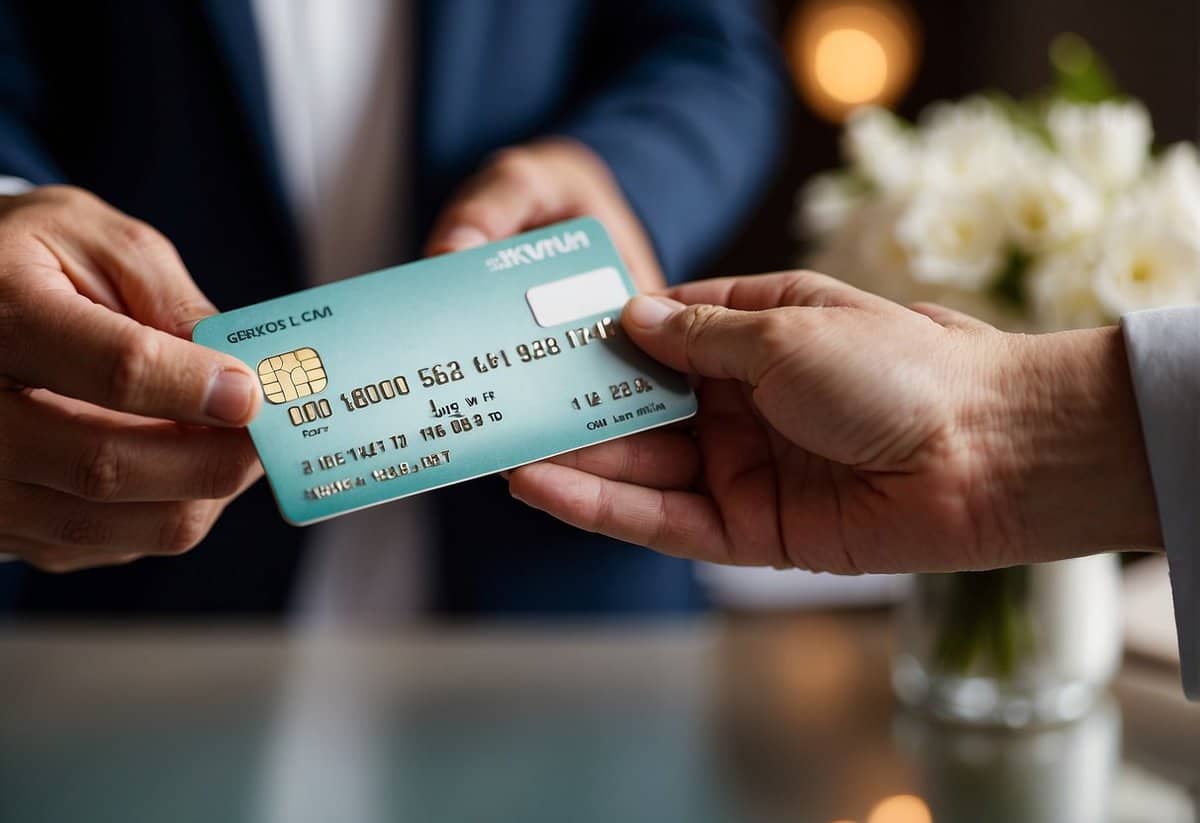Who Pays for the Wedding Night? Decoding Modern Etiquette for Newlyweds
When planning your wedding, one question that invariably comes up is who is responsible for footing the bill for the wedding night. Traditionally, the groom’s family would take on this cost as part of their financial contribution to the wedding. However, contemporary standards are much more flexible, and it’s not uncommon for couples to handle it themselves as part of their overall wedding budget, especially when considering wedding night accommodations.

The modern approach to financing a wedding is increasingly collaborative, with costs often split between the couple and their families. Instead of adhering to rigid rules about who pays for what, conversations and decisions about the wedding night and broader expenses can revolve around financial ability and personal preference. It’s a discourse worth having early in the wedding planning process to set clear expectations and ensure that your special day concludes as delightfully as it unfolds.
Key Takeaways
- The payment for the wedding night has shifted from traditional expectations to more flexible modern arrangements.
- Couples often share the costs of the wedding night as part of their overall budget and personal preferences.
- Early financial planning for the wedding ensures clear expectations and a well-orchestrated celebration.
Budgeting for the Wedding

When planning your wedding, it’s crucial to establish a clear budget early on and understand who may contribute financially. Taking these steps can make the difference in how you approach the entire planning process.
Determining Who Pays
Traditionally, the bride’s family has been responsible for a majority of the wedding costs, while the groom’s family would cover the remainder, including the rehearsal dinner. However, with the age of marriage increasing, couples are more often funding their own weddings, either in full or by splitting costs with their families. It’s essential to have discussions with all involved parties to understand their willingness and ability to contribute.
Contribution Expectations
Conversations about money can be sensitive, but they’re necessary for setting accurate budget expectations. Outline the average cost of a wedding in your region to set a realistic baseline. For instance, some families may offer a set amount of money, while others might choose to cover specific expenses, like the bride’s dress or catering. Transparency regarding contributions is key to avoid misunderstandings down the line.
Managing Wedding Expenses
Once you’ve nailed down who’s paying for what, it’s time to manage those wedding expenses wisely. Here are some tips to keep in mind:
- Create a Detailed Budget: List each category, such as venue, attire, and vendors, to track spending.
- Prioritize: Decide what aspects of your wedding are most important to you and allocate funds accordingly.
- Emergency Fund: Set aside a small portion of your budget for unforeseen costs.
- Monitor Spending: Regularly update your expenses sheet and compare it against your budget to stay on track.
- Consider opening a credit card with benefits for wedding-related purchases to potentially earn rewards or cash back.
By having everyone on the same page with contributions and maintaining a vigilant eye on spending, you can navigate the financial aspect of your wedding with confidence and less stress.
Pre-Wedding Events and Preparations

Your journey to the altar is marked by several key pre-wedding events, each with its own set of traditions and financial considerations. From the initial engagement celebration to the final send-off before the big day, here’s what you need to consider as you plan and budget.
Engagement Party and Bridal Shower
After you’ve said “yes,” the engagement party is often the first official celebration. It’s a chance to share the excitement with friends and family, and traditionally, the bride’s parents host and cover the costs of this event. As you revel in the bliss of your upcoming nuptials, it’s an opportune time to show off your ring and start discussing plans with a potential wedding planner.
The bridal shower follows suit as a more intimate gathering, usually for the bride and her close female friends and relatives, including bridesmaids and the maid of honor. This event is commonly hosted by the maid of honor or a close family member, and it often includes gift-giving to help set up your new home. You can use this time to coordinate your wedding attire with your wedding party.
Rehearsal Dinner
The rehearsal dinner happens after the wedding rehearsal, usually the night before the wedding. This dinner is typically hosted and paid for by the groom’s parents. It’s not just about practicing the walk down the aisle; it’s a moment to thank your wedding party—which includes your groomsmen, bridesmaids, best man, and maid of honor—for their support.
Bachelor/Bachelorette Party
The bachelor and bachelorette parties are a final hurrah as a single person and are often organized by the best man and maid of honor, respectively. While party costs can vary widely, attendees usually cover their own expenses and sometimes chip in for the honoree’s portion. These celebrations can range from a simple night out to a weekend getaway, so planning ahead is crucial to ensure everyone is prepared for any expenses.
Wedding Day Financing

When planning your special day, understanding the financial aspects of each part of the wedding ensures there are no surprises. Let’s take a closer look at what you might be expected to pay for.
Ceremony and Accommodations
The venue where you exchange vows can range from free if it’s a public space or a place of worship (though donations are often appreciated) to several thousand dollars for exclusive locales. Remember that the cost often correlates with the size and exclusive use of the venue. Accommodations for you and your guests, such as lodging or hotel room blocks, usually follow the ceremony and can be negotiated at a group rate if booked in advance.
Reception and Associated Costs
After the vows, the wedding reception takes center stage. This is where most of your budget will likely go. Costs include:
- Catering: Food per person can vary greatly; be sure to consider this when choosing your menu.
- Entertainment: Whether you hire a band or a DJ, fees can differ based on their popularity and time of service.
- Wedding cake: Depending on the design and size, prices can widely vary.
- Tips: Don’t forget that it’s customary to tip your vendors, which can add to the final cost.
Flowers, Decoration, and Attire
Decorating your venue with flowers and decorations that fit your theme is next. This can include everything from corsages and boutonnieres to table centerpieces and floral arrangements.
For attire:
- The dress may be one of the more significant single expenses.
- Groom’s attire may be purchased or rented.
- Wedding rings are a lasting investment, so consider their cost early on.
- And don’t forget the bride’s bouquet, which often has a design that complements the overall wedding decor.
Whether you opt for luxury or simplicity, each aspect contributes to the ambiance of your wedding day. Careful planning and budgeting can ensure these elements align with your expectations without breaking the bank.
Post-Wedding Responsibilities

After the excitement of your wedding day has wound down, it’s important to turn your attention to the post-wedding responsibilities. This includes settling final costs and ensuring the honeymoon goes smoothly.
Travel and Honeymoon Considerations
When planning your honeymoon, remember that travel and accommodations for the wedding night and beyond are typically the responsibility of you and your spouse. If you’re having a destination wedding, you may have already combined the wedding location with your honeymoon spot for convenience. For those taking later flights, arrange airport transportation in advance, ensuring a stress-free departure. Relying on a hotel planner can help in executing these plans efficiently.
It’s also a good idea to keep track of any deposits you may have made on accommodations, so you can reconcile these with the final bills. If your honeymoon destination requires travel, consider sending save-the-dates to share the itinerary with wedding party members or family and friends who might join for a postwedding brunch as part of the extended celebration.
Handling Gratuities and Final Payments
As you close out your wedding accounts, remember that final payments to vendors should include the distribution of gratuities—an essential aspect of proper etiquette. Tips are typically given to service providers such as the catering staff, wedding coordinator, and musicians. For guidance on the appropriate amounts, the advice of Emily Post on wedding etiquette is invaluable.
Don’t forget gratitude for gifts. While you may have opened some wedding gifts at the reception, it’s critical to send thank you cards promptly. Each message should be personalized, showing appreciation for the guest’s choice of gift and their presence at your wedding. Take turns with your spouse to make this task more manageable.
Remember that these gestures reflect your appreciation not only for the gifts but for the support and love shown by your wedding party members and guests on your special day.
Frequently Asked Questions

When you’re planning for your wedding, understanding who usually covers the various costs can make your experience smoother. Below are specific questions and explanations to guide you through this aspect of wedding planning.
How is the cost for the wedding night accommodations typically divided?
Typically, you and your partner are expected to cover your own wedding night accommodations. However, each couple’s situation can vary, and making arrangements based on what’s best for you is always acceptable.
What are the customary expenses for the groom’s family in a wedding?
The groom’s family traditionally takes care of certain expenses like the rehearsal dinner and the bride’s rings. Additionally, they may contribute to the cost of flowers and the honeymoon.
What wedding costs are traditionally covered by the bride’s parents?
Traditionally, the bride’s parents may pay for the wedding reception, which includes the venue cost, food, and drink. Yet, this can depend on individual family circumstances and traditions.
What cultural variations exist in terms of who pays for wedding expenses?
Cultural norms can greatly influence who pays for wedding expenses. For example, in some cultures, the bride’s family covers most costs, while in others, such as in Ireland and the UK, these norms vary.
How are pre-wedding celebrations and costs like the rehearsal dinner handled financially?
Pre-wedding events like the rehearsal dinner are often hosted and paid for by the groom’s family. This tradition supports the starting point of sharing the wedding journey and costs among the two families.
What is the usual division of financial responsibilities for honeymoon expenses?
While varying by generation, it’s common now for couples to cover their own honeymoon expenses, sometimes with contributions from family members as a wedding gift.

